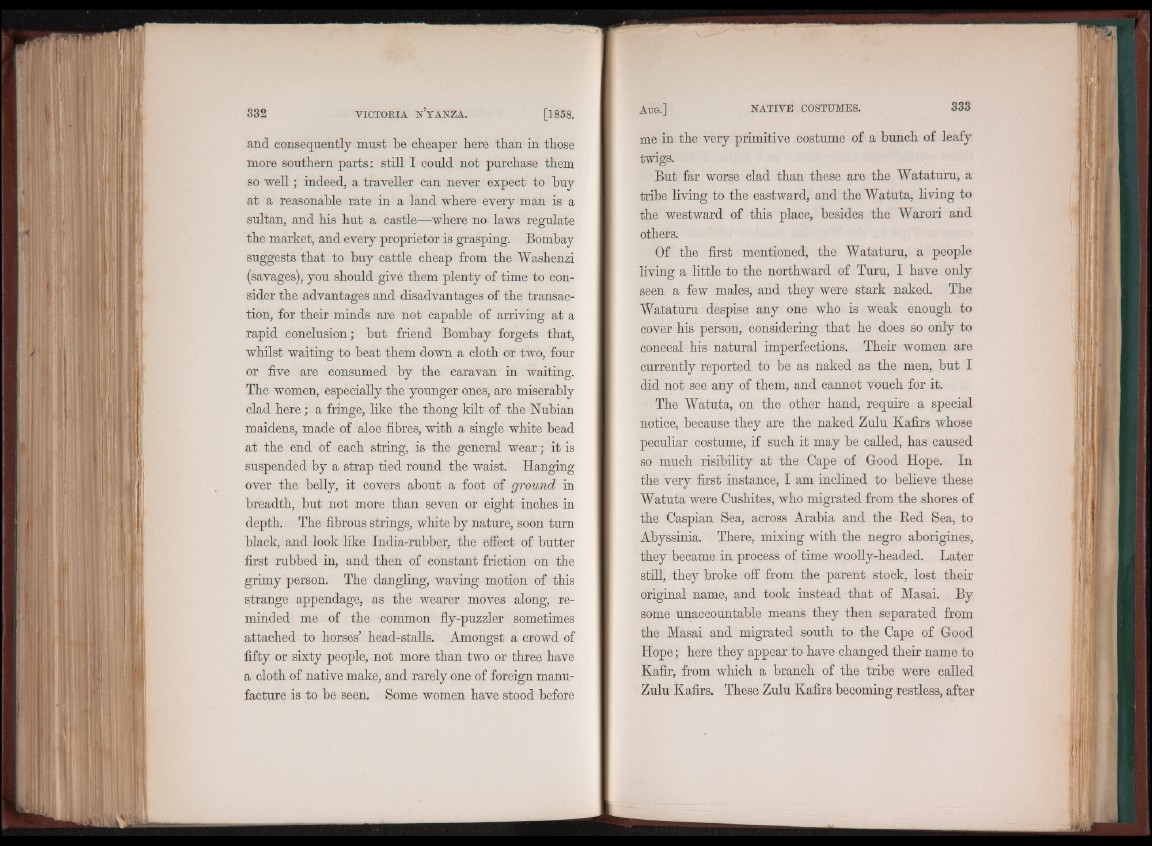
and consequently must be cheaper here than in those
more southern parts: still I could not purchase them
so well; indeed, a traveller can never expect to buy
at a reasonable rate in a land where every man is a
sultan, and his hut a castle—where no laws regulate
the market, and every proprietor is grasping. Bombay
suggests that to buy cattle cheap from the Washenzi
(savages), you should give them plenty of time to consider
the advantages and disadvantages of the transaction,
for their minds are not capable of arriving at a
rapid conclusion; but friend Bombay forgets that,
whilst waiting to beat them down a cloth or two, four
or five are consumed by the caravan in waiting.
The women, especially the younger ones, are miserably
clad here; a fringe, like the thong kilt of the Nubian
maidens, made of aloe fibres, with a single white bead
at the end of each string, is the general wear; it is
suspended by a strap tied round the waist. Hanging
over the belly, it covers about a foot of ground in
breadth, but not more than seven or eight inches in
depth. The fibrous strings, white by nature, soon turn
black, and look like India-rubber, the effect of butter
first rubbed in, and then of constant friction on the
grimy person. The dangling, waving motion of this
strange appendage, as the wearer moves along, reminded
me of the common fly-puzzler sometimes
attached to horses’ head-stalls. Amongst a crowd of
fifty or sixty people, not more than two or three have
a cloth of native make, and rarely one of foreign manufacture
is to be seen. Some women have stood before
me in the very primitive costume of a bunch of leafy
twigs.
But far worse clad than these are the Wataturu, a
tribe living to the eastward, and the Watuta, living to
the westward of this place, besides the Warori and
others.
Of the first mentioned, the Wataturu, a people
living a little to the northward of Turu, I have only
seen a few males, and they were stark naked. The
Wataturu despise any one who is weak enough to
cover his person, considering that he does so only to
conceal his natural imperfections. Their women are
currently reported to be as naked as the men, but I
did not see any of them, and cannot vouch for it.
The Watuta, on the other hand, require a special
notice, because they are the naked Zulu Kafirs whose
peculiar costume, if such it may be called, has caused
so much risibility at the Cape of Good Hope. In
the very first instance, I am inclined to believe these
Watuta were Cushites, who migrated from the shores of
the Caspian Sea, across Arabia and the Bed Sea, to
Abyssinia. There, mixing with the negro aborigines,
they became in process of time woolly-headed. Later
still, they broke off from the parent stock, lost their
original name, and took instead that of Masai. By
some unaccountable means they then separated from
the Masai and migrated south to the Cape of Good
Hope; here they appear to have changed their name to
Kafir, from which a branch of the tribe were called
Zulu Kafirs. These Zulu Kafirs becoming restless, after